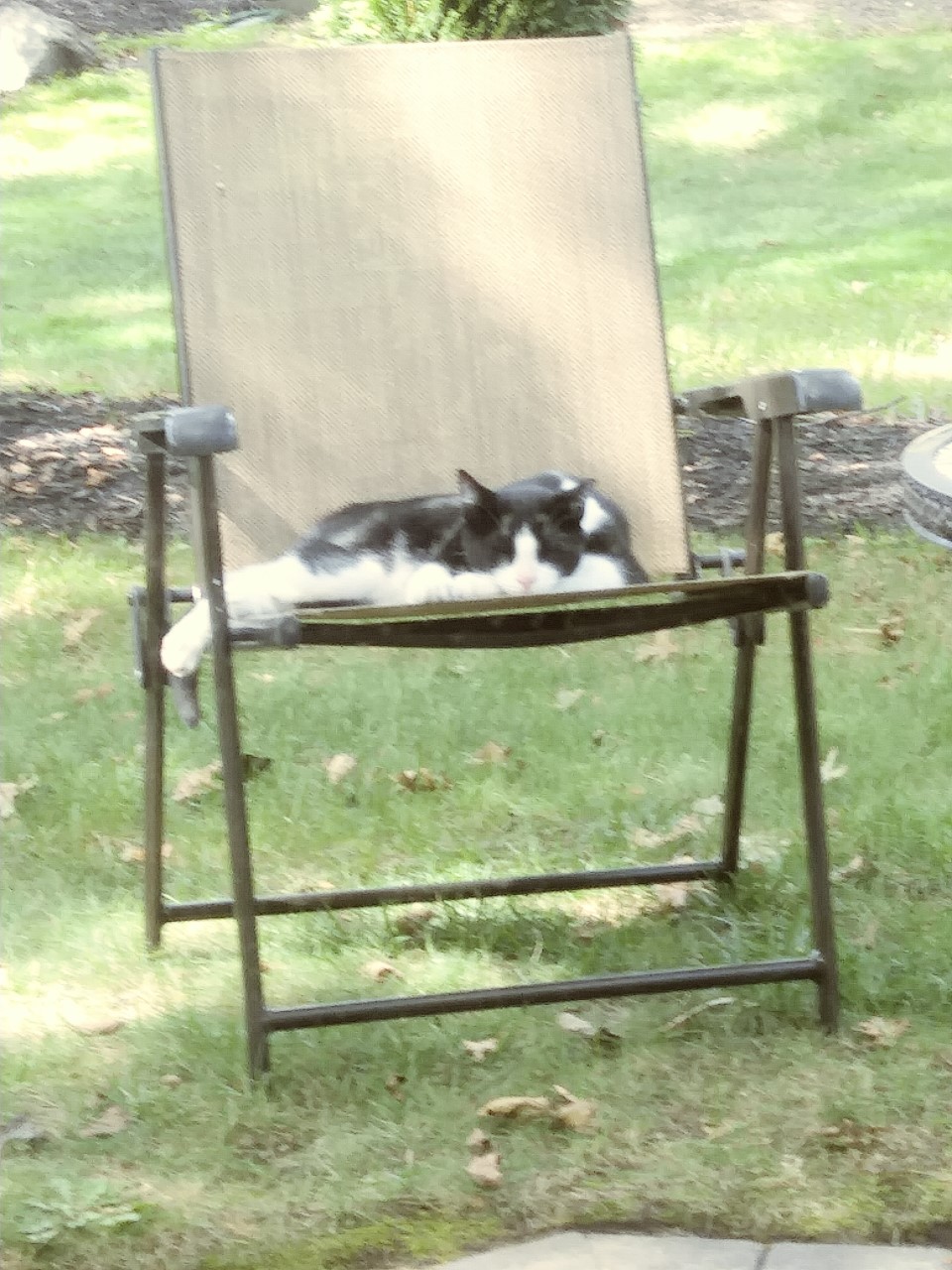 👉 Know Your Cat from the Field of Master Mind Pets (MMPET) 🐱
👉 Know Your Cat from the Field of Master Mind Pets (MMPET) 🐱
Shared from the research of: Joseph Mercado 👨
Article Author: Ronnie Hirsch 👱
Content Contributor: Top Pop Today 🌎
To: Cat Lover 📝
Blog Post #1076 📌
Re: Knowing Your Cats Behavior 👈
Date and Time: Monday, November, 9, 2020 at 12:14 p.m. ⏰
Dear Cat Lover,
Cat owners will probably agree that their pets are just as weird as they are adorable.
Living with a cat means witnessing, and sometimes participating, in many odd rituals.
Those include being gifted a dead mouse and watching in horror as your pet knocks over all the glasses off the table, just because.
Some cats just want to watch the world burn.
But learning about your cat’s behavior is key in ensuring its happiness and well-being.
Read on to learn why your cat does what it does, and how to make sure it’s, in fact, pleased with you.
When They Don’t Let You Work:
Cats don’t have much respect for your personal space or work.
They’ll be happy to sit in your lap, or worse, on your keyboard, just when you’re getting ready to work.
It’s not a big mystery as to why they’re doing so.
This is their way of demanding attention.
When a cat tries to shove its head under your hand when you’re busy writing, that’s its way of telling you it wants you to stop what you’re doing and start paying him attention.
Unfortunately, science hasn’t yet discovered how to tell your cat “go away, I’m busy”.
When They Ignore You:
Sometimes, your cat won’t ask for attention at all and will rather actively ignore you.
You might call it by its name, make cute noises, even promise him pets, but it will stay in its corer and act as if you’re not even there.
Cats aren’t stupid, they know their names and understand when we call them.
It’s just that sometimes, they don’t feel like responding.
Cats like setting the rules. Just like they decide when it’s petting time, they also like to determine when it’s their alone time.
When They Massage Your Legs:
Ever had a very happy cat sit in your lap and knead your legs?
It may be painful, but it’s not because they’re trying to hurt us!
When kittens are fed by their mother, they knead her mammary glands as they nurse.
The movement prompts the production of milk.
As they grow and start eating solid foods, this reflex stays with them.
Sometimes they get so comfortable that they associate it with the comfort of being cared for by their mother, and start kneading like they used to as kittens.
Another possible explanation is that cats are actually stressed when they knead, and that’s their way to relieve the stress.
When They Sniff Your Face:
Like many animals, cats learn a lot about their environment not by looking at it, but by smelling it.
And while our own smell may be familiar to them, as we come and go, we catch other smells.
When a cat catches a new smell, it might want to get close to sniff it properly – just like we might get closer or squint to get a better look at something we see.
But sometimes, your cat gets suddenly closer because it’s looking for your familiar, comforting scent.
Cats will usually try to get close to your face.
That’s because it’s easier to get a whiff of your scent there, in order to make sure you’re not a stranger.
When They Chew On Your Stuff:
If your cat starts chewing things other than his food or toys, it may be a good idea to get him to the vet.
Chewing objects is known as “pica”. There can be a number of reasons why a cat would chew on things, but it’s usually a bad sign.
It could be because the cat is stressed and is trying to relieve some tension, or it may be suffering from nutritional problems and trying to complement its diet.
Either way, chewing, if done frequently, can be very bad for your cat, as small pieces can end up in their digestive system and harm them.
When They Stare At Birds:
Cats can get rather obsessed with birds outside the window.
It’s not uncommon that a cat will stare at a bird while making small chattering sounds.
Some experts believe that these sounds are a sign of frustration.
The bird is right in front of the cat but still out of reach – it wants to catch it, but knows it can’t.
But not all experts agree on this. Others believe this sound is actually their way of warming up their muscles before they jump on their prey.
When They Turn Their Backs On You:
When we humans turn our back to someone, it means we’re done talking to them.
But for cats, it’s just the opposite – when they turn their backs towards us, that’s their way of showing us trust and affection.
If your cat does this, it’s asking you to get closer.
Another way to show their affection is by lifting their tail.
It may not be the most elegant pose, but for them, it’s the ultimate sigh of love and trust. That’s also your cue to start petting.
When They Show You Their Belly:
Sometimes, cats will roll on their backs, with their bellies exposed. A cat’s belly is its most vulnerable spot.
It’s right where their internal organs are, and it’s not protected by muscles or bones like the rest of their body.
Cats are very aware of that vulnerability, so they have to be very comfortable with you to roll around like this.
But what are they trying to say?
Usually, if it’s not just stretching, it means they want to play.
Another option is that they’re trying to cover as much territory as possible and get their scent everywhere.
Since it’s hard to determine the reason for this behavior, we suggest approaching carefully.
Don’t try to pet a cat’s belly unless you know it well and understand it’s, indeed, a display of playfulness.
When They Cry In the Middle of the Night:
One very annoying feline habit is their tendency to pace around at night and make noises.
It’s usually tolerable until they start wailing and interrupting your sleep.
Why do they do this? They may be trying to catch some prey in the house.
If they fail to catch it, they might cry out of frustration.
When it’s already nighttime and they’re wailing, there isn’t much you can do, but you can reduce this behavior over time by playing with your cat during the day, so that by nightfall they’re tired and not looking for sources of entertainment.
When They Crawl Into Tight Spaces:
Cats love snuggling in small, tight places. Put a box next to a cat, and you can bet it will climb into it in seconds.
The same goes for corners, cabinets, and other such nooks and crannies.
The reason cats love these tight spots is that they make them feel safe. When they’re cooped up in a tight spot, they feel like they’re in a den, and no one can sneak up on them from behind.
However, it’s very important for cat owners to make sure that their cats don’t take this habit too far and get stuck in places they can’t get out of!
Make sure your cat has a safe spot to snuggle in, like a shoe box, so that it doesn’t go look for one.
When They Start Running Around the House:
Your cat might start running around the house for seemingly no reason. But in fact, they have a very good reason for this behavior – restlessness!
In the wild, cats are hunters.
They keep themselves busy by looking for prey and chasing it down.
Indoor cats usually don’t have the same opportunities to let off energy, so they engage in a short PE sessions.
Still, sometimes those bursts aren’t enough to relieve all of your cat’s energy, and it may end up frustrated and bored.
To prevent that from happening, try playing with it a bit more during the day.
When They Bring You the Spoils of Their Hunt:
We have now arrived at one of the most painful aspects of owning a cat – their strange habit of presenting their loved ones with gifts like a dead mouse or bird.
It’s gross, but from the cat’s perspective, it’s a lovely gesture.
When kittens are weaned off their mother’s milk, they’re still not strong enough to hunt food.
That’s why their mother will bring them food like dead rodents and birds. That also means they’re officially part of the pack.
So when your cat brings you food, it’s usually his way of showing his appreciation.
A cat doesn’t have a lot it can do for you, so this gesture is pretty adorable when you come to think about it.
When They Fall Asleep Belly Up:
If your cat lies on his back with his legs spread apart, that mean he’s relaxed and comfortable. Just like rolling on their back, this pose exposes their most vulnerable parts.
A cat will only lie in this position when it feels completely safe, so if you find your cat lying around the house in this pose, give yourself a pat on the back!
You’ve created a safe, comfortable environment for your feline companion.
When They Stop Cleaning After Themselves:
Cats have a habit of covering up their excrement.
In the wild, it’s a way to cover their scent and avoid being detected by possible predators.
House cats don’t shake their wild habits easily, and will cover their feces in their litter boxes as well.
If your cat stops doing this, it’s not because it realized there weren’t any predators around.
It’s usually a sign of a problem.
The litter box may not be suitable for your specific cat, it may be stressed, or there might even be an underlying health issue.
Do not take this behavior lightly.
When They Move Their Ears Around:
Cats’ hearing is excellent, and their ears are built to catch any small noise.
That’s why their ears are also very flexible.
Cats can move their ears around easily, kind of like a satellite dish.
But their ear movement can also tell you a lot about their feelings.
When your cat’s ears are pointed forward, it usually means it’s happy and relaxed.
On the other hand, when they flatten their ears back, it means they’re either agitated or defensive.
They do so to protect their ears in case they have to lunge on a possible threat.
So if your cat does this, it’s wise to leave it alone for the time being.
When They Hunt Your Feet:
Another cute-yet-annoying habit most cats display is pouncing on their owners’ feet. They love doing so regardless of how much you move. In fact, you can be completely still and they’ll jump on you out of nowhere.
It can catch you off guard, but it’s not a sign of aggression. For your cat, it’s just a game. Since cats are predators by nature, their games are usually related to hunting. It’s a great way to practice and get better.
If this annoys you, you can always get a toy for your cat to jump on instead.
When They Doze Off:
If you own a kitten and it’s sleeping half the time, don’t worry.
Your kitten is probably just fine.
Kittens are still developing, and just like human infants have to get their 10 hours of sleep to grow, so do kittens have to nap to allow their bodies to develop. Adult cats also sleep quite a lot during the day.
That’s because they’re saving their energy for when they need it to hunt.
If your cat is alert, play with it – it will help him fall asleep faster.
When They Purr:
There are a lot of theories as to why cats purr, but we don’t actually have a scientific explanation.
It’s still one of nature’s mysteries.
So what do we know? First, that’s it’s a form of communication with other cats.
While we usually assume cats purr out of delight, it’s not always a sign of happiness or relaxation.
One theory is that they purr to calm themselves down when they’re stressed, as the sensation of vibration soothes them.
Maybe that’s why we’ve come to associate purring with relaxation – it feels nice when your cat curls up in your lap and starts purring.
When They Join You In the Bathroom:
Cats are known to be independent animals, but they can also be clingy at times. Some cats will follow their owners to the bathroom, of all places.
Experts don’t have a clear answer as to why cats do this, but they suspect it’s out of vulnerability. Cats don’t like to be away from their pack, and for house cats, that means away from their humans. Of course, they have no idea that we humans want to do our business in privacy.
In fact, the closed door might even provoke their curiosity.
When They Move Their Tail:
Dogs wag their tails to show their excitement and happiness.
Cats wag their tails too, but it means something completely different.
When a cat wags its tail, it means it’s angry, irritated or just wants some alone time.
So if you see your cat wagging its tail back and forth, give it the space it needs.
But that’s not all a cat can say with its tail.
If you see your cat’s tail twitch, it usually means your cat is curious about something around him.
The twitch is a sign of focus.
When They Hiss:
Cats communicate their anger very effectively, so most people know a hissing cat is an angry cat, even if they don’t know all that much about cats.
But hissing isn’t just a way of communicating anger. Cats will also hiss when they’re afraid, and will try to ward off a threat by making that horrible sound.
If your cat is afraid of something, the best thing to do is try and get rid of the threat.
Let your cat calm down before you approach. If you try to pet it when it’s still on edge, you’ll likely end up with a good scratch.
When They Knock Things Off the Table:
If you’ve ever owned a cat, you’ve probably lost a glass or two when your feline friend decided to push it off the table.
Cats don’t seem to care if your glass is half full or half empty; if it’s a Styrofoam cup or part of your expensive china set.
This behavior goes back to hunting. In nature, cats love to play with their prey before killing it, so they might be thinking your glass is a sort of prey.
But another explanation is that your cat is simply bored and craves attention or entertainment. If you’ve lost one too many glasses, try playing with your cat with a break-proof toy.
When They Don’t Use Their Litter Box:
Litter boxes are designed to imitate a cat’s natural environment – a place where it’s supposed to feel comfortable to do its business.
When everything’s just fine, your cat will use the litter box, cover its feces and move on without making a mess.
But if your cat litter is outside the box, it means there’s a problem.
There can be several reasons for this, the most common one is that your cat doesn’t like the litter box or its location.
That can be solved easily by getting a new one or finding a better spot for it.
But if your cat still doesn’t use his box, it’s time to check for health issues.
When They Get High On Catnip:
Catnip is a leafy plant that cats absolutely LOVE.
When a cat sniffs catnip, it gets a bit wild, making weird noises and rolling around.
This reaction is due to the nepetalactone inside the plant – a sort of oil that causes a reaction in the cat’s nose, triggering joy and hallucinations.
Funnily enough, this works on large felines such as lions, as well as on house cats.
So if you want to show your cat some good ol’ time – let him sniff some catnip.
When They Blink At You:
Cats can be very expressive. They love to communicate using their faces, and especially their eyes.
If your cat starts staring at you, it’s probably because it wants your attention. But beware – if the stare is too long or you cat seems hostile, it might be a sign of aggression. To get them to calm down, try to stare back.
But if they’re blinking at you slowly, it means they’re trying to tell you they love you! Isn’t that sweet?
When They Bite Their Nails:
Not only humans bite their nails – cats do it too. There are a few reasons why a cat would bite its nails. It could be because it’s anxious, or it could be because it’s bored. Other times, it’s simply a part of its grooming routine.
If you’re not sure and are worried about your cat, pay close attention to when and how often they show this behavior. If it’s once in a while, your cat is probably just fine. But if it bites its nails excessively, there might be something wrong.
Cats also bite their nails for health reasons. There might be a parasite or infection that’s keeping your cat’s paws irritated, so check with your vet to make sure your cat is healthy.
When They Curl Up On Your Chest:
Cats love being close to their family. At the end of a long day, your cat might curl up on your chest and start snoring.
There isn’t a bigger sign of love and trust than this.
Cats are not easily trusting creatures.
They’re usually scared of what they don’t know, and will keep away to protect themselves.
So when a cat sleeps on your lap, it means it has absolute trust in you.
Why the chest area? Cats enjoy our body heat, and the sensation of the chest rising and falling seems to comfort them.
When They Bite You:
Cats bite sometimes, and it can be very unpleasant.
But don’t jump to conclusions.
A bite doesn’t mean your cat hates you, just like when a human kid yells it’s not (necessarily) because he hates you.
You might have crossed a boundary with your cat, and it’s trying to make you stop.
It could also be a game, or it may even be an instinctive reaction.
The best way to know for sure is to watch your cat’s environment and body language.
But whatever the reason, don’t take it personally. You’ll both get over it soon enough.
When They Sneak Up On You:
Cats like to sneak around. They sneak on their owners, on prey, and on other cats.
It’s not that they don’t know they’re sneaking around, and it’s not that they’re being mean.
It’s just another thing that goes back to their nature.
Domesticated cats are still predators, and they have the sharp instincts and urges of predators.
They may have lived their entire lives indoors, but they still have these instincts embedded in them, and it’s not like they know that they don’t have to hunt for food.
So they practice all the time: they practice on you, on your other pets, on insects and birds, and even on their canned food.
There isn’t much to do about it but accept this behavior.
When They Chew Grass (And Then Puke It):
It’s fairly common knowledge that cats are carnivores, meaning that they eat meat.
But some cats also chew on grass.
They can’t’ actually digest the grass, as their stomach isn’t suited for it.
So why do they do it?
First, chewing grass leads to vomiting, and vomiting clears their digestive system.
Sometimes, they’ll chew grass on purpose because their stomach is upset.
Second, the grass has folic acid, which is good for them.
By chewing grass they ingest the acid, even if they can’t actually keep the grass down.
When They Splash the Water In Their Water Bowl:
Cats don’t usually like water, but some enjoy playing with the water in their water bowl and might paw at it before drinking.
They do this because they prefer moving water over still water.
It’s yet another natural instinct, as river water is usually fresher, and river water moves.
So if the water won’t move itself, the cat will move it.
It can be a bit of a nuisance if they spill the water, but there isn’t much you can do about it.
You can, however, place the water bowl over a towel to soak what’s spilled.
When They Meow:
Cats meow as a form of communication. It can mean any number of things.
If your cat meows in your direction, it’s probably saying hello or trying to grab your attention.
Sometimes cats meow at each other in a very aggressive manner.
If you see two cats curling their backs at one another and meowing long, loud meows, it means they’re trying to scare each other off.
If none of them backs up, it will probably end in a fight.
When The Keep On Meowing:
There are other reasons why your cat will meow at you.
It’s usually because it needs your attention, but it can be more specific than that.
It may be hungry, for example.
If you can hear your cat meowing but can’t actually see it, it might be stuck somewhere and needs your help.
Lastly, a cat might meow out of pain.
If he seems uncomfortable or irritable, a checkup at the vet would probably be a wise move.
When They Press Their Head Against the Wall:
You might have seen video compilations of this behavior online: cats sitting with their face against the wall and making unusual noises.
If you see your cat do that, get to your vet immediately.
This behavior is not normal and may imply of brain damage.
Your cat might have been physically injured, or it could be a sign of disease or even a tumor.
Either way, go straight to your vet.
When They Stand On Their Hind Legs:
Cats usually walk on all fours, but they do have the ability to stand up on their hind legs, thanks to their flexible spine.
This ability has a few uses: first, they can reach high places without jumping.
Second, when they’re feeling threatened, they can stand up to look bigger in the hopes of scaring the threat away.
At home, they’ll probably do it to get to a treat or catch a fly situated on the window.
Don’t worry about it, they know what they’re doing.
When They Scratch Your Couch:
Cats scratch everything. You can buy them the best, most expensive scratching post in the pet store, and they’ll still prefer your couch.
Scratching is just something they like to do, and it’s also something they need to do.
It’s their version of nail filing: it gets rid of the dead layer of their claws and keeps them short and sharp.
It’s also another opportunity to spread their scent, and they like the feeling on top of that.
If their scratching is driving you crazy, try getting them a scratching post.
Try a few models if they ignore the first one you got them.
Eventually, they might just leave your poor sofa alone.
When They Stretch:
You don’t need to be an expert to understand why cats like to stretch – we humans love doing it too!
Stretching has the same benefits for cats as it does for humans: it gets their blood flowing, gets rid of toxins in their muscle tissue, and keeps their joints ready for action.
If you look closely you’ll notice they tend to do it after naps, as it helps them get their body going.
It’s also one of those things they only do when they feel safe, so if your cat stretches a lot – congrats! You’re doing something right.
When They Jump from Ridiculous Heights and Land On Their Feet:
Cats have one special ability that almost no other animal has: they can jump from high places and land on their feet.
What allows them to do this is their super-long, super-flexible spine. They have extra vertebrae in their spine, and a flexible backbone. They use it to twist their bodies mid-air and face the ground when they fall, thus landing on their feet and avoiding any harm.
Their entire bones structure actually helps them with that. Their light bodies and thick fur also helps them move around gracefully. Cats are so good at landing on their feet, that they can do all these maneuvers when they’re only six weeks old.
When They Rub Up Against You:
Cats say hello by rubbing their face against your legs or face. Experts believe it’s their way of showing affection. They do so both with other cats as well as their humans.
But sometimes, they accidently bump a bit too hard. Fear not, this is never a sign of aggression.
So what does is mean when a cat head-butts you? First, it’s a sign of absolute trust. A cat will never rub against a person he doesn’t know or feel comfortable with. Second, it’s their way of marking you as their own. As they bump into you, cats rub their pheromones on you.
This behavior is also known as “bunting”.
When They Show You Their Rear End:
Every now and again your cat will stick its rear end high in the air for no apparent reason, especially when you’re petting him. They’re not being rude – they’re just asking for more pets.
The base of the tail is a sensitive spot in the cat’s body, so when you pet them there, it feels real good. Your cat will stick his back up to encourage you to pet him there, so don’t be shy and pet away!
When They Curl Up Like a Ball:
The first reason for curling up into a tight ball is simple – it keeps the cat warm. It’s also a great way to stay protected. The cat’s belly and internal organs stay protected when it’s curled up like this.
Lastly, cats are smaller in size when they curl up, and that allows them to fit into tight spots where they feel more protected. A well-loved, happy cat will often curl up like this in its favorite spot in the house.
Know that when they do this, they feel safe and comfortable.
Content Source: TopPopToday.com

 Email Us a Message
Email Us a Message 

Please send us a personal message below and we will serve you momentarily.



 Fly Over to the MMU Facebook Page with Hoot
Fly Over to the MMU Facebook Page with Hoot 

 Visit the MMA Facebook Group Today
Visit the MMA Facebook Group Today 